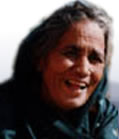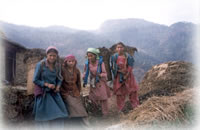 |
 |
||
 |
|||
|
RELATED THEMES education family life social institutions OTHER LOCAL THEMES BACKGROUND |
gender
Testimonies have been collected with women of different ages, and include one mother and daughter. Some of the older women narrators (India 1 and India 4) were local founders and leaders of various protest movements, including the well known Chipko movement against deforestation. These women assumed positions of leadership having had little or no education, and at a time when many in their communities deemed their actions inappropriate. Two interviews are with younger women who have become elected community leaders through the formal panchayat system. While still relatively pioneering in taking on such responsibilities, these younger women clearly benefited from the struggles of the female activists a generation earlier, and from the chance of education. India 32 acknowledges the important role her mother (India 1) played in helping her to attain the position of village head. Women also seem to be active in a range of social institutions. The Mahila Mangal Dals (rural women's councils) are run within villages by and for women, but have also provided a channel for women to communicate and network between villages. Many narrators refer to the easing of women's workloads and of social restrictions: "Their workload is reduced and their freedom increased in comparison to the past because they are educated now, and other facilities have increased. A new social order has set in. In the past work was the only thing to be emphasised." (India 9). Yet some (India 8) are not so positive: "There is no change in their condition especially in the remote areas. There they get up at four o'clock in the morning and get busy in their work till 10 o'clock at night." And many mention that male migration has increased the burden of agricultural work on women. There's also some suggestion that the adoption of modern agricultural practices is sidelining women's skills in cultivating traditional crops. And several say that the new road networks have actually increased restrictions on some women's freedom to move around because of the fear and likelihood of encountering strangers. Despite the undoubted advancement of some women, traditional attitudes towards sons and daughters continue to have influence. For example, India 2 remarks, "Yes, family planning is good. But due to the constant increase in the first borns being girls and a desire for boys, this is not possible. Because even today, the birth of a son is considered essential for the redemption of the ancestral obligations." Another narrator (India 7) describes the preference for educating sons: "Girls are good in education, but few people are interested in educating girls. It is due to discrimination. People feel that one day the daughter has to go to her in-law's house. If she is educated she may not do household chores like working on fields or cutting the fodder.." Recognising the continuing power of such attitudes, a few narrators stress the need for women themselves to become aware of their rights and capabilities and press for change, rather than waiting for the wider society to alter. India 33 explains, ". it is necessary for the woman to be alert herself. The family members would want that she should not go out and instead cook food, so that she stays under control. I myself told all the women representatives that, 'as long as you are unaware of your rights, you shall be under the pressure of others'. The person who is ignorant remains a slave.whether it's a man or a woman." quotes about gender"At first the women never participated [in the village council]. It was not in our custom. But now they do take part in it. In fact, women are now contesting the elections and forming the panchayat." "I have begun to believe that the jewellery that is made for us is like the decoration made for the cows and buffaloes. In one sense it is meant for the same purpose, to make us bow down. There is pain here and there, and then we are constantly worried that it will get lost. If nothing else, it was a kind of bondage for us..." "Earlier it was the girl's father who searched for a suitable groom but now.the mother and daughter's decision is necessary." ".both boys and girls were treated as equals. People had very few children... Those who had more daughters were considered very rich since all the work depended on them. Men only cut wood and ploughed the field. Everything else was done by women. So they were greatly respected.But the tables have turned now." "When I was elected [to the council], people wondered whether a woman can become a head? Can a woman do social work? .Can a woman go in a marriage procession or to cremate the dead? .But we assured them that we can do everything. We are also humans. I had to do all this work and show them. None of the men, prior to me, were able to do as much." "We do not give dowry. We give a buffalo or two or three buffaloes in mehar (bride price).The special thing about it is that no one else can sell that buffalo, not even the girl's in-laws. Only the girl herself can sell the buffalo. All the calves of the buffalo will also belong to the girl, and regardless of how many progeny down the line, the animals.remain the girl's property." |
|
 Compared to some other collections on this site, there are a good number of Indian women narrators. Women's experiences, changes in their roles and status, and changing gender relations are a central theme of the interviews and they do present different perspectives and experiences. Although there is much talk of improvements in women's position in society, there is considerable variation in the extent to which women's lives have really changed. There is also evidence of still powerful cultural norms influencing the position and rights of men and women.
Compared to some other collections on this site, there are a good number of Indian women narrators. Women's experiences, changes in their roles and status, and changing gender relations are a central theme of the interviews and they do present different perspectives and experiences. Although there is much talk of improvements in women's position in society, there is considerable variation in the extent to which women's lives have really changed. There is also evidence of still powerful cultural norms influencing the position and rights of men and women.